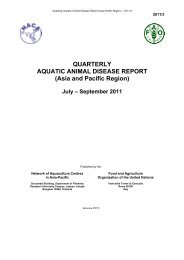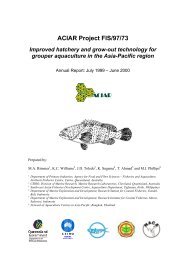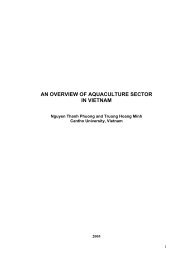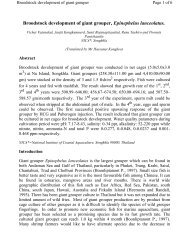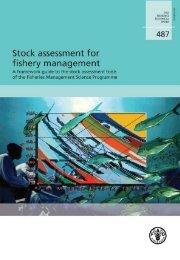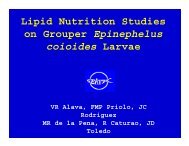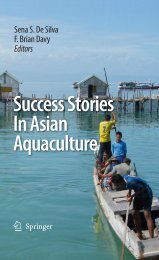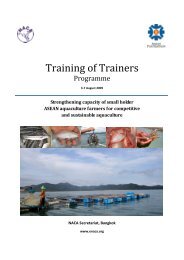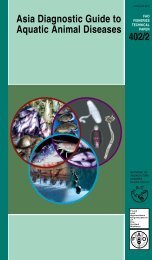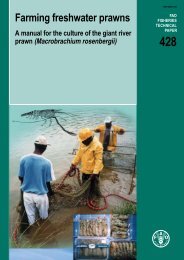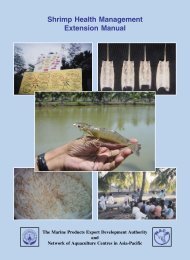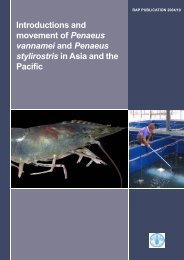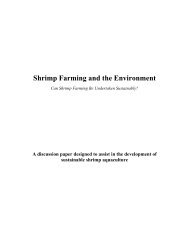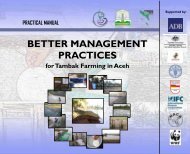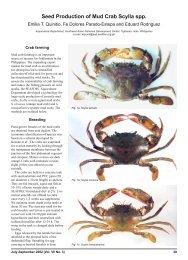State of World Fisheries and Aquaculture 2004 - Library
State of World Fisheries and Aquaculture 2004 - Library
State of World Fisheries and Aquaculture 2004 - Library
You also want an ePaper? Increase the reach of your titles
YUMPU automatically turns print PDFs into web optimized ePapers that Google loves.
<strong>World</strong> review <strong>of</strong> fisheries <strong>and</strong> aquaculture<br />
63<br />
In the same spirit <strong>of</strong> openness that characterized the negotiating<br />
process, the condition <strong>of</strong> “Party” to the Antigua Convention, either<br />
through signature followed by ratification or through accession, may be<br />
aquired by the Parties to the 1949 Convention, by the coastal states <strong>of</strong><br />
the region (states with a coastline bordering the Convention area) <strong>and</strong><br />
by the states <strong>and</strong> regional economic integration organizations whose<br />
vessels fish for fish stocks covered by the Convention. Moreover, <strong>and</strong><br />
most innovatively, the Antigua Convention makes full use <strong>of</strong> the concept<br />
<strong>of</strong> fishing entity introduced in the 1995 UN Fish Stocks Agreement to<br />
enable Taiwan Province <strong>of</strong> China to participate fully in the work <strong>of</strong><br />
the IATTC. To this end, throughout the provisions <strong>of</strong> the Convention,<br />
a distinction is made between two categories: on the one h<strong>and</strong>, the<br />
“members” <strong>of</strong> the Commission <strong>and</strong>, on the other, the Parties to the<br />
Antigua Convention. The members <strong>of</strong> the Commission are defined as<br />
including the Parties <strong>and</strong> “any fishing entity” that has expressed its “firm<br />
commitment to abide by the terms <strong>of</strong> the Convention”. 5<br />
This means that states <strong>and</strong> the regional economic organizations<br />
(e.g. the EU), are necessarily both Parties <strong>and</strong> members while the fishing<br />
entity can only be a member. The specific competences <strong>of</strong> each one<br />
<strong>of</strong> these two categories are also clearly <strong>and</strong> precisely stipulated (for<br />
instance, all members are entitled to take decisions under Article IX,<br />
except those decisions related to the adoption <strong>of</strong> amendments to the<br />
Convention, which are the exclusive competence <strong>of</strong> Parties).<br />
The Antigua Convention was opened for signature in Washington<br />
on 14 November 2003. By the end <strong>of</strong> May <strong>2004</strong>, 11 states had signed<br />
it <strong>and</strong> the fishing entity had also signed its respective instrument. The<br />
Antigua Convention will enter into force once seven <strong>of</strong> the Parties to<br />
the 1949 Convention have deposited their instrument <strong>of</strong> ratification,<br />
approval, acceptance or accession.<br />
1<br />
In June 1998 the IATTC adopted a resolution establishing a working group to review<br />
the 1949 Convention. The working group met 11 times from October 1998 to June 2003.<br />
The full text <strong>of</strong> the Convention is available at http://www.iattc.org/PDFFiles2/Antigua%20<br />
Convention%20Jun%202003.pdf; accessed September <strong>2004</strong>.<br />
2<br />
All parties participated in the negotiating process. Their number grew during the<br />
negotiations. They totalled 13 in June 2003: Costa Rica, Ecuador, El Salvador, France,<br />
Guatemala, Japan, Mexico, Nicaragua, Panama, Peru, the United <strong>State</strong>s, Vanuatu <strong>and</strong><br />
Venezuela.<br />
3<br />
Canada, China, Colombia, the Republic <strong>of</strong> Korea as well as the fishing entity that will<br />
have the possibility <strong>of</strong> becoming a member <strong>of</strong> the Commission (but not a Party to the<br />
Antigua Covention) under the name “Chinese Taipei”.<br />
4<br />
Op. cit., see footnotes 11, 13 <strong>and</strong> 14, pp. 27 <strong>and</strong> 35; for Agenda 21, see http://<br />
www.un.org/esa/sustdev/documents/agenda21/index.htm; accessed September <strong>2004</strong>.<br />
5<br />
The Parties are themselves legally “bound” by the Convention; they are not merely<br />
committed to abide by its terms.



